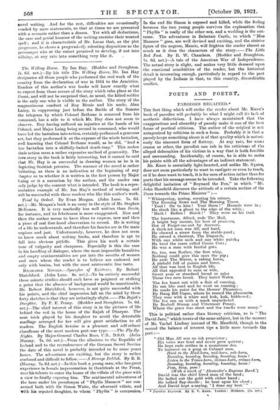READABLE NOVELS.—Spangles of Existenfm By Robert Blatchford. (John Lane. 6s.
net.)—To bo entirely successful these minute studies should each have so poignant or striking a point that the absence of background would be unnoticeable. Mr. Robert Blatchford, however, is not quite successful with his points, and the chief impression left on the mind by these forty sketches is that they are irritatingly slight. —The Rajah's Daughter. By F. E. Penny. (Hodder and Stoughton. 7s. 6d. net.)—Tho chief interest of this story is in the pictures of life behind the veil in the house of the Rajah of Dharpur. The neat trick played by his daughter to avoid the detestable marnage arranged for her will give great satisfaction to all readers. The English heroine is a pleasant and self-reliant chauffeuse of the most modern post-war type.—The Fly-By- Nights. By Major-General Charles R033, C.B., D.S.O. (John Murray. 78. 6d. net.)—From the allusions to the Republic of Ireland and to the recrudescence of the German Secret Service the date of this novel is probably intended to be some years hence. The adventures are exciting, but the story is rather confused and difficult to follow.—A Strange Delilah. By B. B. (Murray. 78. 6d. net.)—In this book a young man, who has great experience in female impersonation in theatricals at the Front, uses his talents to enter the house of the villain of the piece with a view to finally exposing him. The sentimental adventures of the hero under his pseudonym of " Phyllis Manners " are con- cerned both with Sir Simon Waite, the aforesaid villain, and With his reputed daughter, to whom " Phyllis " is companion.
In the end Sir Simon is exposed and killed, while the feeling between the two young people survives the explanation that " Phyllis " is really of the other sex, and a wedding is the out- come. The adventures in Balastair Castle, to which "Miss Manners " goes, are well devised and exciting, and the sinister figure of the negress, Mamie, will frighten the reader almost as much as it does the characters of the story.—The Little Red Foot. By R. W. Chambers. (Hodder and Stoughton. 7s. 6d. net.)—A tale of the American War of Independence. The actual story is slight, and makes very little demand upon the emotional sensibilities of the reader, but the historical detail is interesting enough, particularly in regard to the part played by the Indians in that, to this country, discreditable conflict.






































 Previous page
Previous page